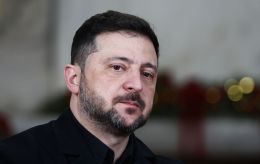'Peace negotiations haven't stalled, they haven't really started.' Interview with Wolfgang Ischinger
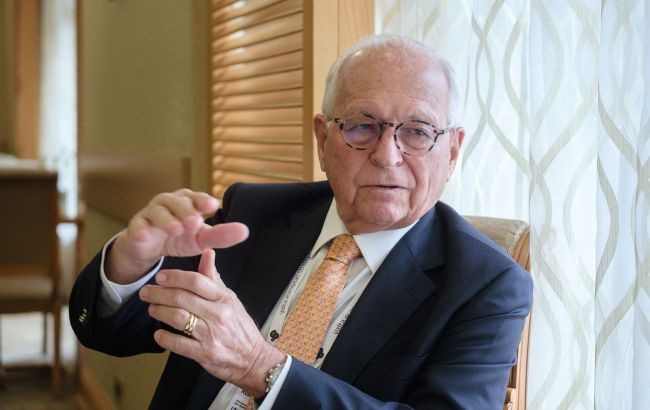 Photo: Wolfgang Ischinger, longtime chairman of the Munich Security Conference (All photos by Vitalii Nosach/RBC-Ukraine)
Photo: Wolfgang Ischinger, longtime chairman of the Munich Security Conference (All photos by Vitalii Nosach/RBC-Ukraine)
In an interview with Wolfgang Ischinger, longtime chairman of the Munich Security Conference, RBC-Ukraine discusses whether Donald Trump's attempts to bring Ukraine and Russia to the negotiating table will succeed, the future of sanctions against Russia, the evolution of the White House’s stance, work with China, and the recent attack on Poland.
The Munich Security Conference is the leading high-level international forum for discussing global challenges. This year's event was especially widely discussed because of the speech by US Vice President J.D. Vance, who delivered a sharply critical assessment of the state of democracy within Europe itself.
After the conference, European leaders — realizing who they will now have to deal with across the Atlantic in the coming years — rushed to insist: Europe must wake up.
"Has Europe woken up?" RBC-Ukraine asked Wolfgang Ischinger, who chaired the Munich Conference for many years. "Yes, maybe not exactly in the way that J.D. Vance was talking about it," Ischinger replied.
Ischinger is a seasoned diplomat who represented Germany as ambassador to both the United States and the United Kingdom, and who also played a role in resolving conflicts in the former Yugoslavia.
Speaking to RBC-Ukraine on the sidelines of the annual YES 2025 conference organized by the Victor Pinchuk Foundation, he noted that peace talks between Ukraine and Russia have not gone quiet, as many assume — in fact, they haven’t really even started yet. And for Putin to finally take diplomacy seriously, Ischinger believes three things are needed: stronger pressure from the United States, the confiscation of frozen Russian assets in Europe, and further strengthening of Ukraine and its military.
— The Russian aggression against Ukraine is ongoing. Will the current peace efforts, which are first and foremost led by the White House administration, eventually lead to success?
— Eventually, yes. However, my assessment is that it will be a very long and difficult road ahead. Long. Not days, not weeks, but long.
— Do you agree that the negotiations are effectively stalled as of now?
— Well, that sounds a little too negative. Let me start with the good news.
The good news is that with the help of the United States or the initiative of the United States, discussions have begun between the US and Russia. Previously, nothing was going on. So, that's on the positive side.
Second, the discussions that have so far been held between the United States and Russia have not, in my humble opinion, led to any indication that Russia is currently or in the foreseeable future willing to sit down in order to seriously discuss the modalities of either a ceasefire or a peace arrangement.
In other words, I would not say the negotiations have stalled. I would say the negotiations have not really started. And we are hopeful that at some point they will.
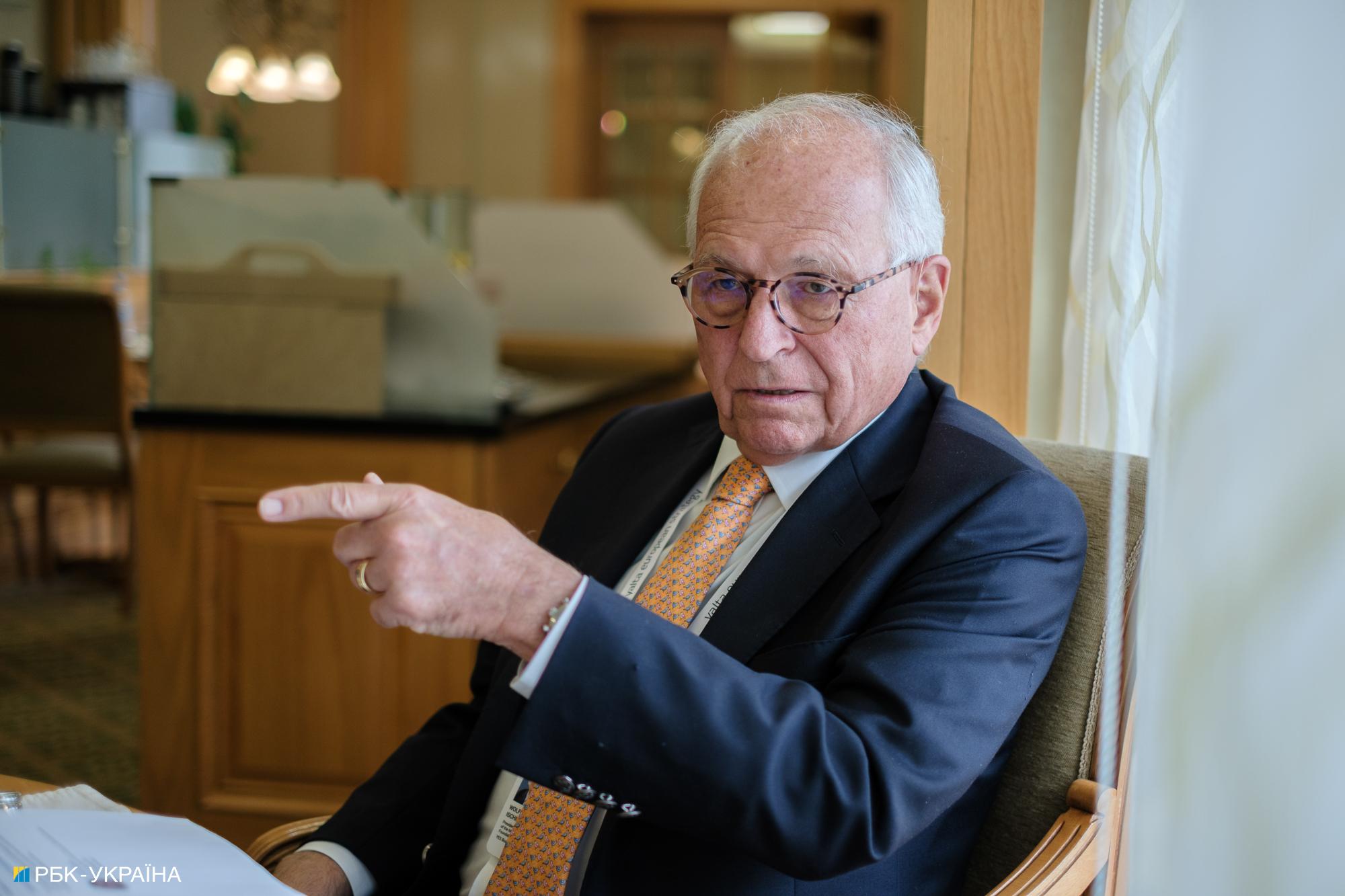
— How to make Putin finally agree to real, substantial negotiations?
I was the chief negotiator for Germany when an international effort was undertaken 30 years ago to end the war in the Balkans. And I spent many months of my life working with, you know, Milosevic (Slobodan Milosevic - Ed.), etc. And I learned from these events, these experiences, one simple lesson.
The simple lesson is that if you have two countries that are at war with each other, that is not the same thing as two countries that have a property problem or a tariff problem. When it's about war and peace, it's about life and death. And it is about a leader.
If he ends the war, he will need to justify to his constituency why so many of his young men and women have been sacrificed, and why so many lives have been lost. In other words, at the end of the day, agreeing to peace is for the leader who was at war a personal question of life and death. Or at least a personal question of professional success, all his career. The entire career is at stake.
This stuff is serious. And the only way we can get Mr. Putin, who has initiated a war of aggression against this country, the only way we can get him to actually sit down seriously to negotiate is if, in his mind, the awareness has been created, the certainty has been built that the continued use of his own military power will not lead to any meaningful additional results.
And my question to you: do you believe that today, in mid-September of 2025, Mr. Putin, sitting in the Kremlin, believes that he has run out of options and that things are only going to get worse? And therefore, does he need to sit down and sign on the dotted line? Probably not.
— I think he believes just the opposite.
— He believes that he came home from Alaska with no burden. He came home from Alaska with no additional sanctions. He came home from Alaska without being forced to make any major concessions.
In other words, he came home from Alaska thinking this is actually quite good, and I can continue because I'm not feeling any pain. So, unfortunately, this is why I think negotiations have not even begun.
That's why I don't want to speak of stalling. We need to push the process forward so that he will be willing to actually start negotiations. And there is at this moment no sign of that.
— Are sanctions a possible leverage? And how can you explain President Trump's reluctance to enforce his own ultimatums on imposing sanctions?
— I think three things should happen. I think first of all, the United States will hopefully – I'm not giving up hope – begin to appreciate that the approach trying to tell Putin: if you stop the war, we will give you access to oil and gas, economic benefits, that approach, the red carpet approach, has not worked and will not work.
That's the first thing. Hopefully, the United States will appreciate that it has not worked. Therefore, they should, in my view, restart delivering weapons, restart the weapons program, and, of course, enact the sanctions which have been prepared, the sanctions package which has been prepared in the US Senate.
That would be my first element, the US. More pressure from the United States, financial, military, and sanctions.
Second, I think that we should release the 300 billion or so frozen assets from being sacred Russian money, which we cannot touch. We can only take the interest. I think that intelligent people are capable of finding legally acceptable and financially beneficial ways to give these funds to Ukraine. Maybe not all at once, maybe in installments, but I think this would be the second signal to Russia. We mean business. We are not giving you the money back. This is 300 billion, and you are not going to get it. If you stop the war, we will stop the process of giving it away.
The third element is the security guarantee, strengthening the Ukraine element, which I label the "porcupine strategy."
In my view, the discussions about potentially deploying European troops in Ukraine are probably premature and maybe not useful, because I don't think Russia will ever, ever, ever want to accept NATO country troops in this country.
But what I think is meaningful and doable and quickly doable is that we ramp up financial and military support for Ukraine, so that Ukraine, for the foreseeable future, is going to be the most capable, the most deterrence capable, the most modern, and the most experienced, which it is already, armed forces in Europe. That's the porcupine. That is when you attack the porcupine; it's very painful.
And the idea is that it must be so painful for Russia that they will not even try again. So these would be my three elements. And if they are all taken together, I think they could have an impact.
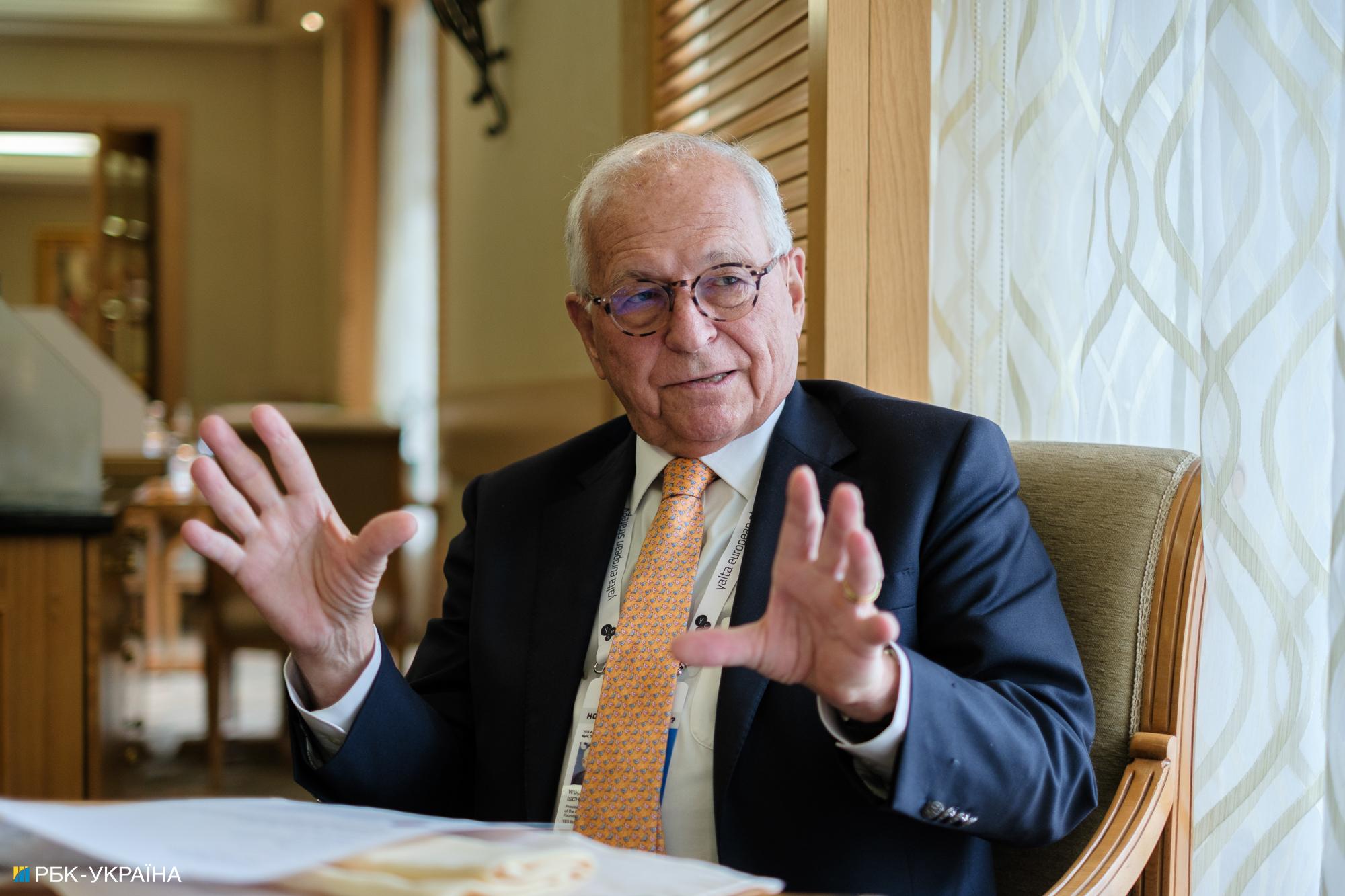
— In the worst-case scenario, if this war of attrition goes on and on, who has better chances, we or the Russians? Whose side is time on?
— There's no doubt in my mind that the Russian war effort is already costing Russia immense resources and wealth and technological advances, and there's a brain drain, etc., etc. So first of all, Russia has already lost enormous assets.
Second, Russia has not only not realized its war aims, namely subduing and conquering Ukraine, and maybe going beyond, but Russia has actually, through its own actions, helped to create NATO, which now includes Sweden and Finland, which now includes a thousand kilometers more border between Russia and NATO, along the Finnish coast. That's the point made by President Stubb in the morning during his speech. In other words, across the board, Russia has already lost or at least not achieved most of its goals.
On the contrary, what has happened runs totally against Russian interests, strategic interests. Secondly, I think the awareness here in Western Europe, maybe not so much in the United States, but certainly in Western Europe, has become stronger that this is not a case of charity, where we give a little charity to Ukraine, but that this is an act of self-preservation of the European way of life, of European culture, of European freedom, of European prosperity. So in other words, it's not only about you, it's about us.
And I think that will make it possible for Europe to maintain this current position of supporting Ukraine strongly, even if it takes a longer period of time, because we know if we stop this, and if we allow Russia to maximize its gains, it will be to our disadvantage. So I'm optimistic.
— At the Munich Conference this February, a high-profile speech was delivered by US Vice President J.D. Vance, which really shocked the European public. And many people, including top politicians, kept repeating that Europe will "wake up." Has Europe woken up as of now?
— Well, yes, maybe not exactly in the way that J.D. Vance was talking about it. But I would give the United States, I would give Donald Trump credit for having pushed, finally, after so many years, having pushed Europe into finally doing much more for our own security. That's been overdue for many years. We had outsourced our security to the United States, and there was really no reasonable explanation why the farmer in Idaho should subsidize the security of a German Mittelstand.
So I would give him credit for that. In other words, yes, Europe has heard the shot and has woken up. But Vice President Vance was, of course, talking about other things too. There are cultural things that play a role here. There is the question of, you know, 'woke'.
So-called "woke agenda." Leftist or gender issues and super liberal issues, migration issues, where the Trump administration has identified mainstream Europe as being on the same course as the nasty Democrats in the US. In other words, we're not friends; we're the problem. We're not part of the solution, we're part of the problem.
So that was the core, I think, of his rather aggressive speech. But I think that we should not spend too much time worrying about that particular speech, because three months later, in May, we organized a conference in Washington DC and Vice President Vance agreed to speak at that conference also.
I actually hosted him; I was sitting on the podium with him. I asked him questions, he responded, and this was totally okay. No more conflict about fundamental values, interpretation of freedom of speech. These issues were not touched upon. We had a meaningful discussion about China, the Middle East, Russia, Ukraine, the transatlantic relationship in general, the role of NATO, etc.
So I think, in other words, maybe in the early weeks of the Trump administration, in February, there was still a lot of nervousness, and they had to make quick speeches, etc. I think now things have started to settle down a little more. And I also believe that the White House, the Trump administration, has begun to understand that there is a value in having allies.
— Even the US needs to have allies.
— Well, actually, I would go further. I would say among the major powers in the world, the United States traditionally is the one that has allies; the others don't. I mean, who is the ally of Russia?
Well, maybe now North Korea, plus Belarus, plus maybe two or three other rogue states. China, as a dogma, has always refused to have an alliance. China wants to be self-governing alone, not with partners.
So the only big power in the world for the last half century or more has been the United States, with important partners in the Asia-Pacific, but also through NATO here in Europe. And I think this is a tremendous asset for the United States. The power, the global power of the United States, rests, of course, also on the US technology and the military budget and the Navy, etc.. But it also rests on the fact that they have these strong allies. The largest US military base connecting America to the entire Middle East is in Germany. You know, Ramstein.
The largest military hospital of the United States is in Germany. It's called Landstuhl, not far from Ramstein. And this is, of course, only an example.
The largest air base that the United States has in the Middle East is in Qatar. And Qatar is considered an ally of the United States, at least to some extent. So American power and outreach have been heavily influenced by the fact that they have partners and allies.
And I think the Trump administration has started to relearn that. When they came in, they thought, "we don't need this," "we are so strongly the number one country, and we don't want to deal with all these international things. We are more isolationist." And now they have rediscovered that America cannot totally isolate itself.
The interests are such that they have to deal with China. They have to deal with Russia. They have to deal with conflicts elsewhere.
— So they have gone through their own evolution.
— There is a learning curve. You saw that also when our leaders recently met with Trump in the White House. That would not have been possible half a year ago. I see a positive learning curve.
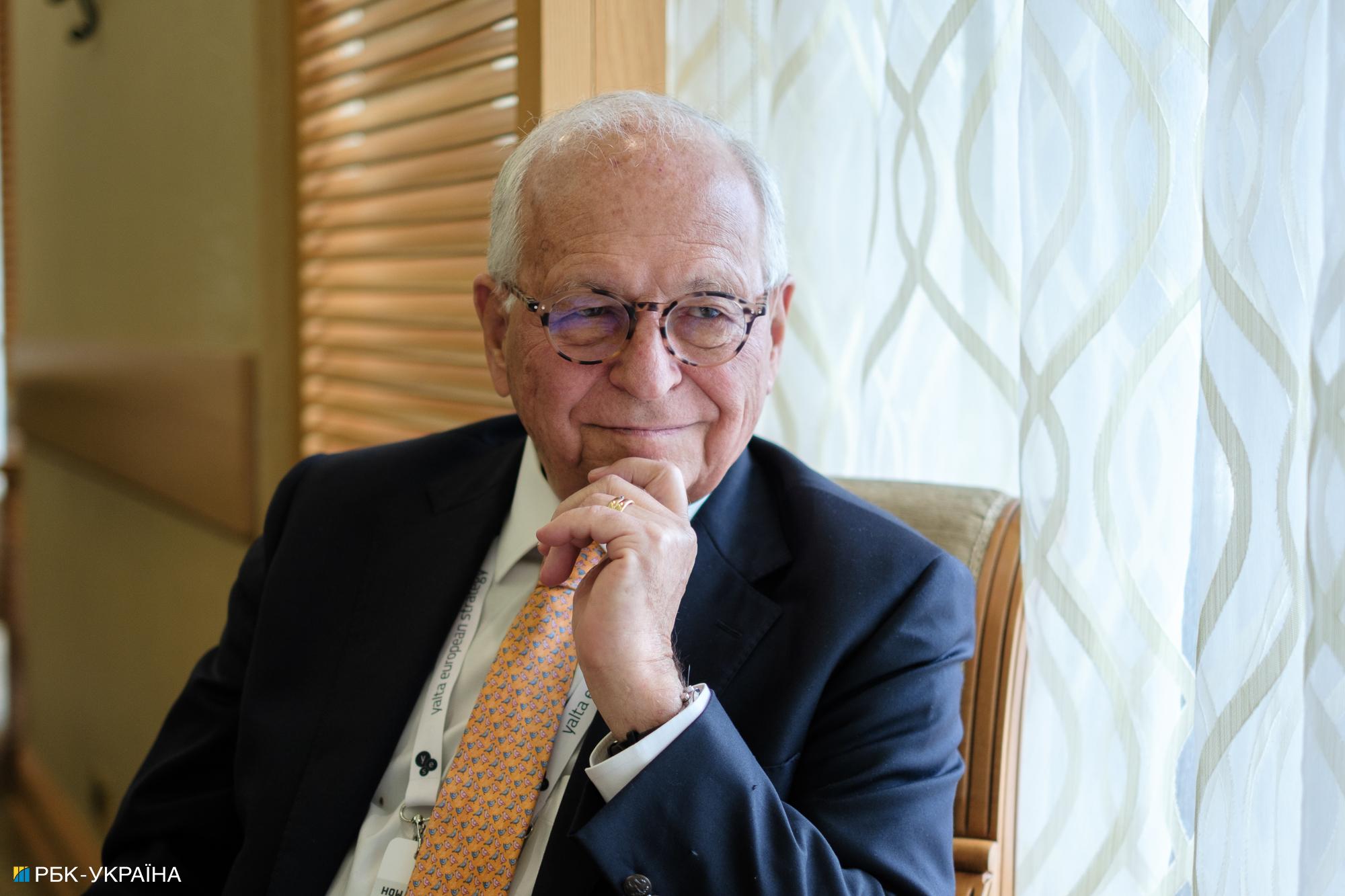
— As for the Russia-China alliance, don't you think that such an alliance has already been created, especially after the recent meetings in Beijing between Putin and Xi?
— Well, no, not really. The pictures were worrisome, yes. And the very warm words exchanged were, how does one say, are giving rise to concern. But I think it's a wild exaggeration if one thinks of India, China, Russia, plus North Korea, plus somebody else, as an emerging alliance. The border conflict between India and China is far from being resolved.
The Chinese elite, at least the older ones, have not forgotten that in 1969, Russia threatened China with the deployment of nuclear weapons. There was a conflict on the Ussuri River in eastern Siberia, etc. So, it's not only harmony.
There are undercurrents of mistrust, and this is why I don't think that we should take the photo of these leaders as an indication: wow, this is a new alliance! It's worrisome because it is, of course, the expression of a willingness to build a system that is no longer built on the Western rules-based international system. So, we should regard it as a challenge.
But what should be the answer? The answer should be that we should embrace India. And I think the United States made a mistake by slamming high tariffs on India after having charmed India in the last couple of years to become a strategic partner of the United States, along with Australia, South Korea, etc.
So, I think the right strategy to counter this image of an emerging alliance is to work with them, to work with India. By the way, also to work with China. China is not our enemy.
China may be a difficult global power for us, but it's not our enemy. I just said at the luncheon, as far as I know, and I hope I'm right, China has so far not recognized the annexation of Crimea as a matter of international law, and they have not recognized the four oblasts as belonging to Russia. In other words, they declared the Russian law, which the Duma passed, annexing the Ukrainian oblasts, as not relevant.
And I think we should talk to the Chinese about this. So, if China says, "We want to uphold the charter of the United Nations, and we want to uphold international law" – very good, thank you very much. Thank you for not recognizing Crimea, but what are our next steps?
I think this conversation should be conducted, not only by us, but also by the United States, talking to China. I have no illusions. I don't think this is going to be easy, but I think only looking at China as a rival and as an adversary is probably not the best recipe.
— I can't help mentioning the recent Russian attack on Poland. So, what should be the response, and do you expect further Russian provocations, in whatever form possible, against NATO, kinetic action against NATO allies?
—I would be surprised if this remained the one and only such incident. Of course, I don't know the details yet, so I have to be cautious, but it strikes me as miraculous that 19 drones, or whatever it was, would at the same time have the same problem with their guidance systems, and it was all a mistake. Well, maybe this is possible, technologically, but look, in international security politics, you cannot be successful if you always assume the least painful assumption.
So, if we now assume, oh, maybe it was just a mistake, and it will not happen again, I think we're not serious. So, we should assume that it may probably have been a test, testing Ukraine, testing Poland, testing NATO, and if it then turns out that it was only a mistake, fine.
So, you always want to base your policy on the worst case, on the possible worst case. It's wise to do this. Not in terms of shooting back immediately, but in terms of assuming that it may be a hostile activity, and therefore it's very important that every detail of this is now being examined by Polish authorities, by others, I'm sure Ukrainian specialists are looking at this stuff that has come down. So it's serious, and not an indication of Russian willingness to sit down and negotiate.

